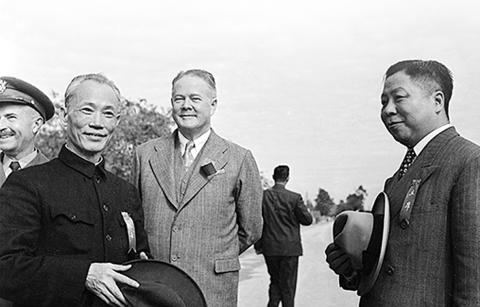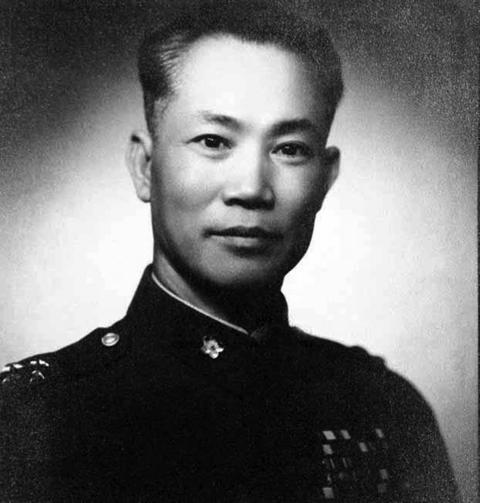Taiwan in Time: Jan. 2 to Jan. 8
It was a total surprise for Chen Cheng (陳誠) when he received a telegram from Chinese Nationalist Party (KMT) leader Chiang Kai-shek (蔣介石) on Dec. 28, 1948, informing him that he was to become Taiwan Provincial Governor as soon as possible.
Chen had been in Taiwan for nearly three months by then, albeit for the purpose of recuperating from stomach surgery after resigning his many military posts, which included First Chief of the General Staff of the Republic of China Armed Forces. On Nov. 12, Chiang sent him a telegram, telling him to focus on his health and not worry about the deteriorating situation in China.

Photo courtesy of Wikimedia Commons
Chen, who was a military man and not a politician, wrote in his memoir that Chiang never asked for his opinion and had not issued a formal order. Chen preferred that Wei Dao-ming (魏道明) keep the position, but Chiang sent him several telegrams, the last one on Jan. 3, 1949 stating “Why have you not assumed your position yet? If you continue to delay, it will only bring trouble and our overall plan will fail.”
Chen had no choice but to report to his post on Jan. 5.
It was a momentous task, as Chen not only had to govern Taiwan and keep it stable as a future base for the KMT to reclaim China, he also had to deal with the massive influx of people from China as well as handle and help set up the governmental and military institutions that were relocating to Taiwan. Furthermore, he acknowledged that the Taiwanese people distrusted the government due to the events of the 228 Incident in 1947.

Photo courtesy of Wikimedia Commons
In a collection of correspondence between Chen and Chiang, it appears that Chen tried to resign several times, citing health issues and his inability to handle the task. But all his requests were denied.
Despite his reluctance, Chen was quite productive during his one year as governor.
To appeal to the peasants in part to prevent them from turning to communism, Chen issued the “375 rent reduction” plan where tenant farmers were not to pay more than 37.5 percent of their annual harvest to their landlords. Prior to that, they often had to pay more than half.
Ou Su-ying (歐素英) writes in The Taiwan Provincial Assembly and the Republic of China’s Relocation to Taiwan (台灣省議會與中華民國政府遷台) that “this drew the ire of the Taiwanese elite, but they were powerless in face of Chen, who controlled both the government and the military.” However, this made him popular among farmers and did help stabilize agricultural society, she adds.
Chen also made extensive currency reforms to tackle the massive inflation of the Taiwan Dollar, issuing the New Taiwan Dollar which is still used today. Finally, in August 1949 he started drafting plans for local self-government, which was implemented at the end of 1950 where people were allowed to elect county and city officials.
Probably the most significant action he took was his declaration of martial law on May 19, 1949, which would remain in place for the next 38 years. This was initially done for weeding out Communists among the massive influx of people from China after the fall of Nanjing, and likely the April 6 student protests against police brutality. However, more restrictive measures would be added, including the Punishment of Rebellion Act (懲治叛亂條例), which originally targeted Communists but was soon used as a means to control and oppress the entire population as the White Terror era came into full swing.
In March 1950, Chen was “forced” into another position as Chiang asked him to succeed Yen Hsi-shan (閻錫山)as premier.
“It’s not that we didn’t have people who could do the job, it’s that nobody wanted to do it, and Chiang eventually sought me out. I did not think I was qualified, but Chiang insisted. We spoke directly and indirectly about this for at least nine times, and in the end he basically ordered me to do it.”
Correspondence shows that he tried to resign several times during his first year on the job, apparently to no avail.
And thus, Chen’s political career continued, whether he was willing or not — even eventually making it to Chiang’s vice president, which he served continuously from 1954 until he finally succumbed to illness in 1965.
Taiwan in Time, a column about Taiwan’s history that is published every Sunday, spotlights important or interesting events around the nation that have anniversaries this week.

Towering high above Taiwan’s capital city at 508 meters, Taipei 101 dominates the skyline. The earthquake-proof skyscraper of steel and glass has captured the imagination of professional rock climber Alex Honnold for more than a decade. Tomorrow morning, he will climb it in his signature free solo style — without ropes or protective equipment. And Netflix will broadcast it — live. The event’s announcement has drawn both excitement and trepidation, as well as some concerns over the ethical implications of attempting such a high-risk endeavor on live broadcast. Many have questioned Honnold’s desire to continues his free-solo climbs now that he’s a

As Taiwan’s second most populous city, Taichung looms large in the electoral map. Taiwanese political commentators describe it — along with neighboring Changhua County — as Taiwan’s “swing states” (搖擺州), which is a curious direct borrowing from American election terminology. In the early post-Martial Law era, Taichung was referred to as a “desert of democracy” because while the Democratic Progressive Party (DPP) was winning elections in the north and south, Taichung remained staunchly loyal to the Chinese Nationalist Party (KMT). That changed over time, but in both Changhua and Taichung, the DPP still suffers from a “one-term curse,” with the

Jan. 26 to Feb. 1 Nearly 90 years after it was last recorded, the Basay language was taught in a classroom for the first time in September last year. Over the following three months, students learned its sounds along with the customs and folktales of the Ketagalan people, who once spoke it across northern Taiwan. Although each Ketagalan settlement had its own language, Basay functioned as a common trade language. By the late 19th century, it had largely fallen out of daily use as speakers shifted to Hoklo (commonly known as Taiwanese), surviving only in fragments remembered by the elderly. In

Lines between cop and criminal get murky in Joe Carnahan’s The Rip, a crime thriller set across one foggy Miami night, starring Matt Damon and Ben Affleck. Damon and Affleck, of course, are so closely associated with Boston — most recently they produced the 2024 heist movie The Instigators there — that a detour to South Florida puts them, a little awkwardly, in an entirely different movie landscape. This is Miami Vice territory or Elmore Leonard Land, not Southie or The Town. In The Rip, they play Miami narcotics officers who come upon a cartel stash house that Lt. Dane Dumars (Damon)